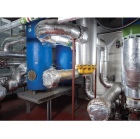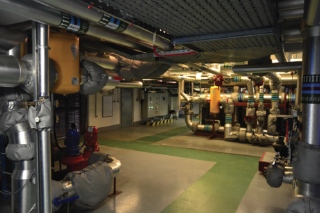Fluid first

As system components become more high tech and the drive for greater energy efficiency increases, it’s not enough to just fit the best products on the market. Treating system water as a key component is increasingly being seen as the only way to deliver the best results —as Martin Wilkinson of Spirotech explains.
The design-and-build stage is key for all commercial heating systems — whether you are installing at a university, a local authority or a landmark office development. The processes under which products are specified have improved greatly in recent years, as has the quality of boilers and their component parts.
Modern systems are the polar opposite of the cast-iron highly inefficient products installed historically. Today’s product is more efficient, far cheaper to run and better performing. Whilst there are countless benefits to installing a modern efficient boiler, the downside is that new systems are highly sensitive and more susceptible to contamination and corrosion, brought about largely by poor water quality.
Whereas, historically, cast-iron boilers could withstand dirt, their modern counterparts cannot; they will slow, malfunction or fail completely if dirt (magnetite) is allowed to populate a system. Where air isn’t constantly being removed from a system by degassing, dirt will always accumulate, leading to eventual breakdown and failure.
With so much emphasis placed on the hero products, namely boilers or chillers, the most crucial element — the water — is often given scant consideration — to the detriment of long-term system health and functionality. The problems associated with poor water quality ultimately result in added costs for maintenance and management teams, as magnetite and non-metallic contamination will start to accumulate and cause problems to new systems within a relatively short period.
Such problems are frequently encountered, and we see the damage that poor water treatment can wreak on a regular basis. Two recent examples are at the University of Wolverhampton and at the University of Strathclyde, both of which witnessed a transformation in system functionality and eradication of contamination problems by addressing issues of water quality through the removal of air and dirt.
On the whole, if water quality is not taken into consideration and measures not put in place to remove air and dirt, optimal system performance cannot be achieved or maintained. All components in today’s systems will likely have an A or B energy label from day one of installation, but the level of energy efficiency will rapidly decline if the water is not treated correctly.
The end-result of a dirty system is imbalance, which means decreased pump performance, as well as the possibility of increased breakdown periods, excessive wear and higher energy consumption. Ultimately, all these issues cost the end-user more money in the long run and inevitably result in a more expensive maintenance programme and the chance that system components will have to be replaced more frequently.
For many new installations, if the design is good and if the appropriate degassing unit has been specified for the size and type of building, then there is an argument that no dirt separators should be required at all. Also, for that matter, there is no automatic requirement to continually dose the system with inhibitors, which can be more problematic.

Indeed, our work with the University of Strathclyde has shown this to be the case, as the only system on the whole estate that gives Andy McWatt, senior mechanical engineer, consistent problems is one that has been heavily dosed in the past.
This issue is an important one to be aware of, as while chemicals do have an important role to play when used correctly, overdosing of systems can have an adverse effect, especially when we consider that certain materials, like aluminium, when used for heat exchangers as part of a system can actually speed up the corrosive process.
Maintaining good water quality is an ongoing consideration, and this is especially true when servicing and maintaining systems. Any new liquid introduced into the system must be properly treated and degassed, otherwise oxygen-rich liquids will give rise to the associated problems.
Any chemicals programme, therefore, should always be made in consultation with someone who can provide detailed analysis and has the wherewithal to recommend an appropriate dosing regime.
A good initial design, delivered in conjunction with a respected partner, will help guard against many additional factors that can also allow air to enter the system — such as an expansion vessel being too small or located at the wrong point, an incorrect initial-fill pressure or pressure differences over regulating valves.
A key part of any good design, though, must recognise the importance of water quality as being at the root of a properly functioning system. Failure to treat system fluid as a key component will inevitably lead to malfunction, breakdown and premature failure of valuable system components.
Martin Wilkinson is Spirotech’s national sales manager for commercial.







